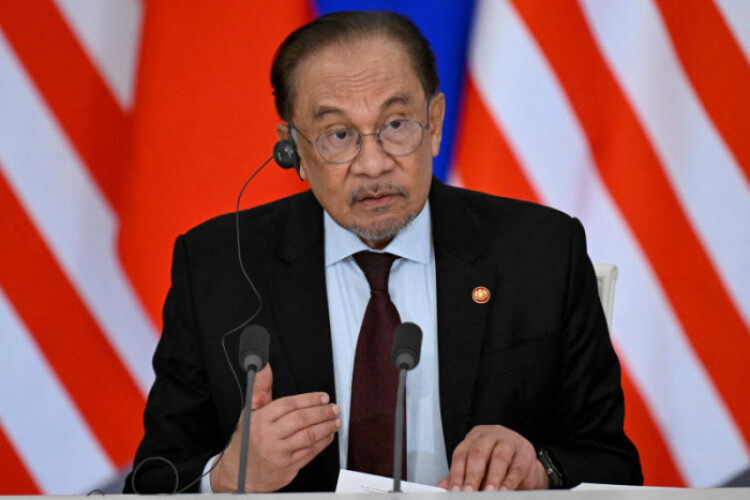
KUALA LUMPUR — After more than two years of relative political stability in Malaysia, Prime Minister Anwar Ibrahim faces multiple hurdles that could fuel discontent within his ruling coalition.
He must replace two ministers who quit after their defeat in party elections, while dealing with a key ally angered by another minister’s plans to switch parties. He is also fighting a sexual assault lawsuit, and his administration is racing to secure a trade deal with the United States and avert a 24% tariff.
While elections are not due until early 2028, investors are watching for signs of instability, wary of a return to the revolving door of leaders that preceded his administration. Malaysia has one of Southeast Asia’s strongest economies, but the nation’s stocks have dropped over 7% this year even as emerging-market shares rose. The ringgit is up 5.5%, but the growth outlook is worsening.
“Trust is low. Can Anwar get back people’s trust on his ability to lead?” said Syaza Farhana Mohamad Shukri, a political science associate professor at the International Islamic University Malaysia. “For me this is a hiccup — but a major one.”
Anwar caught a break on Tuesday, when a Malaysian court agreed to temporarily pause a civil lawsuit by a former aide who says he was sexually assaulted by the leader.
Anwar denies the allegations and is trying to get the Federal Court to rule whether a sitting prime minister can be sued. While not a criminal case, the lawsuit is an unwelcome distraction that could contain testimony that could hurt his public image.
Anwar’s office did not immediately respond to requests for comment.
The premier’s future is important for investors. Anwar also doubles as finance minister and his plans to reduce petrol subsidies is seen as an important — but unpopular — measure needed to prevent a deficit blowout.
His administration has also launched the long-term National Semiconductor Strategy, the National Economic Transformation Plan and the New Industrial Master Plan 2030. Anwar would need a second term to see those through.
He has also yet to implement institutional reforms such as limiting the prime minister’s rule to two terms and separating the role of the attorney-general and solicitor-general.
The government was shaken on May 28, when Economy Minister Rafizi Ramli and Natural Resources and Environmental Sustainability Minister Nik Nazmi Nik Ahmad said they would leave the cabinet. Both were defeated in an internal election for the People’s Justice Party, or PKR, that was marred by allegations of vote-rigging and nepotism. Rafizi was beaten by Anwar’s daughter in the PKR polls.
Days later, Investment, Trade and Industry Minister Zafrul Aziz said he was leaving the United Malays National Organisation to join Anwar’s party. UMNO, a key ally in the ruling coalition, was quick to warn the PKR against accepting Zafrul’s membership.
Zafrul’s move is unlikely to fracture the coalition as long as UMNO retains its seven ministerial posts, said Wong Chin Huat, a political analyst at Sunway University. But it may affect sentiment within Anwar’s own party, he cautioned.
“The VVIP treatment that Zafrul enjoys has triggered dissatisfaction within PKR, especially after Rafizi and Nik Nazmi resigned and reinforced the norm and expectation that ministerial post is tied to party mandate,” he said.
The prime minister has handled setbacks before. Anwar was deputy prime minister in the late 1990s before he was jailed for sodomy and abuse of power, charges he claimed were trumped up by his political rivals.
“We don’t expect it to be always smooth sailing,” said Tan Chong Koay, founder of Pheim Asset Management. “But it’s not a significant concern. Anwar is an experienced politician — he will find a way to make it work.”
He must replace two ministers who quit after their defeat in party elections, while dealing with a key ally angered by another minister’s plans to switch parties. He is also fighting a sexual assault lawsuit, and his administration is racing to secure a trade deal with the United States and avert a 24% tariff.
While elections are not due until early 2028, investors are watching for signs of instability, wary of a return to the revolving door of leaders that preceded his administration. Malaysia has one of Southeast Asia’s strongest economies, but the nation’s stocks have dropped over 7% this year even as emerging-market shares rose. The ringgit is up 5.5%, but the growth outlook is worsening.
“Trust is low. Can Anwar get back people’s trust on his ability to lead?” said Syaza Farhana Mohamad Shukri, a political science associate professor at the International Islamic University Malaysia. “For me this is a hiccup — but a major one.”
Anwar caught a break on Tuesday, when a Malaysian court agreed to temporarily pause a civil lawsuit by a former aide who says he was sexually assaulted by the leader.
Anwar denies the allegations and is trying to get the Federal Court to rule whether a sitting prime minister can be sued. While not a criminal case, the lawsuit is an unwelcome distraction that could contain testimony that could hurt his public image.
Anwar’s office did not immediately respond to requests for comment.
The premier’s future is important for investors. Anwar also doubles as finance minister and his plans to reduce petrol subsidies is seen as an important — but unpopular — measure needed to prevent a deficit blowout.
His administration has also launched the long-term National Semiconductor Strategy, the National Economic Transformation Plan and the New Industrial Master Plan 2030. Anwar would need a second term to see those through.
He has also yet to implement institutional reforms such as limiting the prime minister’s rule to two terms and separating the role of the attorney-general and solicitor-general.
The government was shaken on May 28, when Economy Minister Rafizi Ramli and Natural Resources and Environmental Sustainability Minister Nik Nazmi Nik Ahmad said they would leave the cabinet. Both were defeated in an internal election for the People’s Justice Party, or PKR, that was marred by allegations of vote-rigging and nepotism. Rafizi was beaten by Anwar’s daughter in the PKR polls.
Days later, Investment, Trade and Industry Minister Zafrul Aziz said he was leaving the United Malays National Organisation to join Anwar’s party. UMNO, a key ally in the ruling coalition, was quick to warn the PKR against accepting Zafrul’s membership.
Zafrul’s move is unlikely to fracture the coalition as long as UMNO retains its seven ministerial posts, said Wong Chin Huat, a political analyst at Sunway University. But it may affect sentiment within Anwar’s own party, he cautioned.
“The VVIP treatment that Zafrul enjoys has triggered dissatisfaction within PKR, especially after Rafizi and Nik Nazmi resigned and reinforced the norm and expectation that ministerial post is tied to party mandate,” he said.
The prime minister has handled setbacks before. Anwar was deputy prime minister in the late 1990s before he was jailed for sodomy and abuse of power, charges he claimed were trumped up by his political rivals.
“We don’t expect it to be always smooth sailing,” said Tan Chong Koay, founder of Pheim Asset Management. “But it’s not a significant concern. Anwar is an experienced politician — he will find a way to make it work.”










